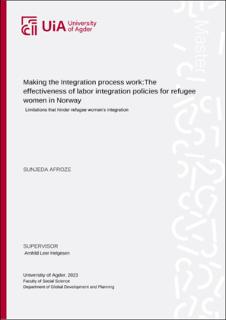| dc.description.abstract | Globally, millions of refugees and migrants are crossing borders, seeking to flee social, economic, cultural, and political inequity and violence, and searching for a better life. Migrant and refugee women are considered a vulnerable group who may experience challenges in adapting to a new country. As the world continues to face the challenges of increasing refugee rates, strengthening and implementing the integration processes, especially labor integration, becomes essential for the host countries. Hence, the study aims to explore the difficulties and challenges refugee women face in their daily lives. This research was conducted in the municipality of Kristiansand in Norway. Ten participants from non-Western countries and NAV officials conducted semi-structured interviews to achieve this aim. The results of the findings were transcribed and analyzed using a mixed coding and thematic analysis.
The study results showed that several challenges related to refugee women's integration into the market largely depend on human and social capital. Challenges such as language proficiency approval of the educational documents studies in Norway constituted human capital in their integration into the labor market. Despite efforts to overcome these challenges and acquire human capital still, most refugees still need the relevant job. Most participants believe that the introduction program offered by the government positively impacted labor integration. Nevertheless, social capital –regarding social networks and social-cultural participation- is also essential in job-seeking. Regarding strategies, most participants join social gatherings and social activities and master the native language. Along with this, most of them wish to explore them with the new society, giving years, and some initial steps were taken by them as work as their initial strategy, which facilitate their integration process actively on the society. | |
